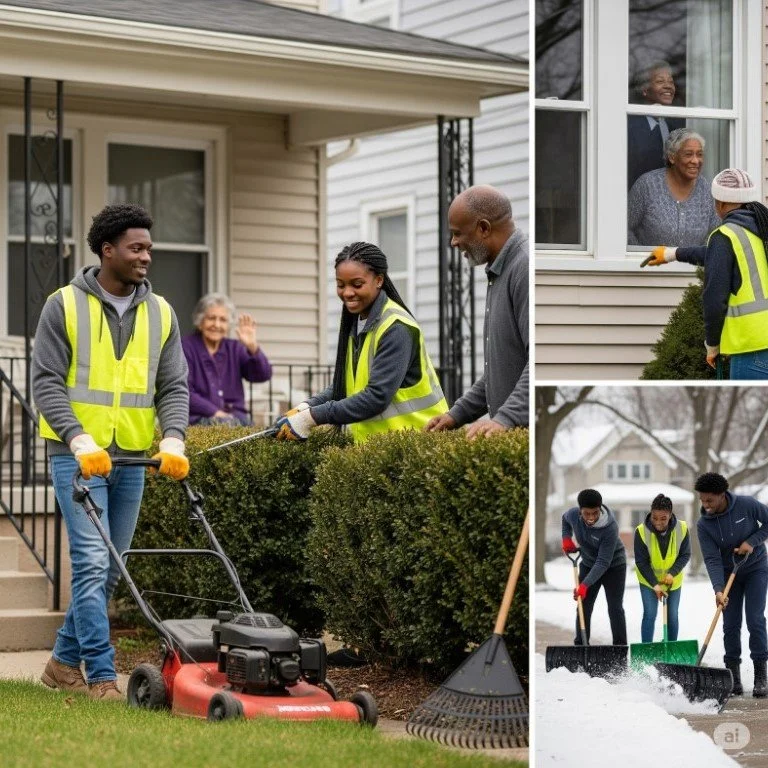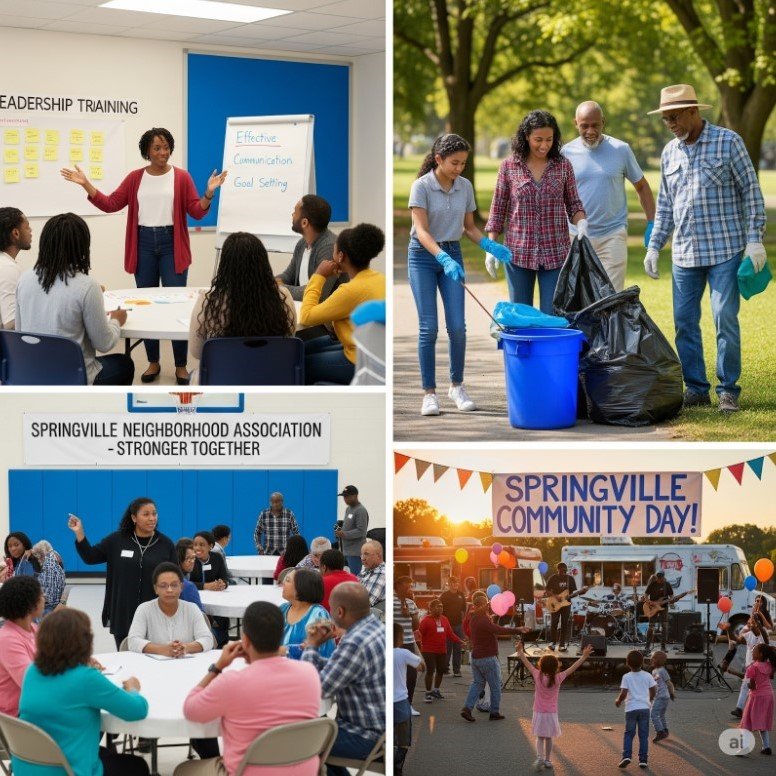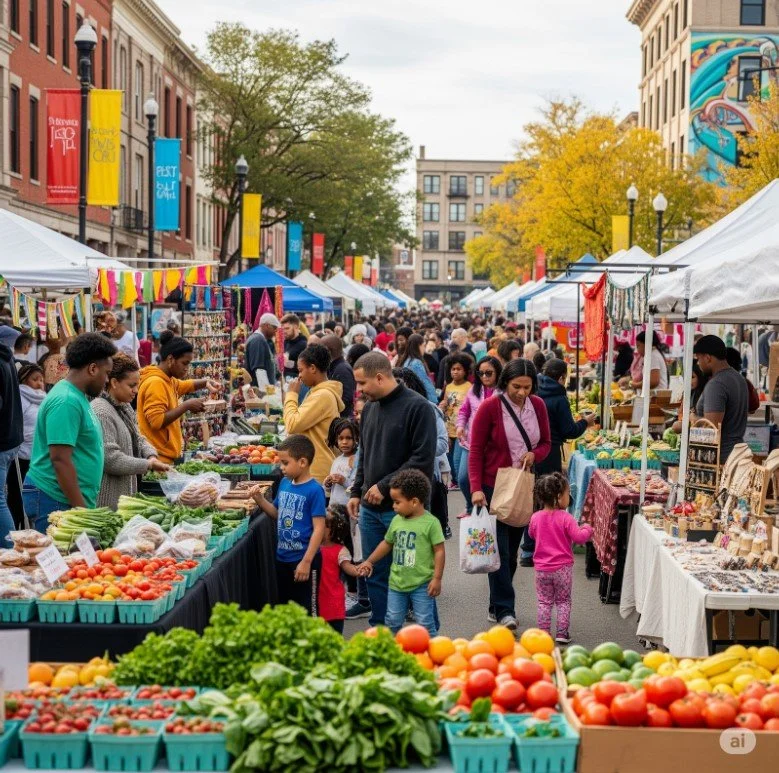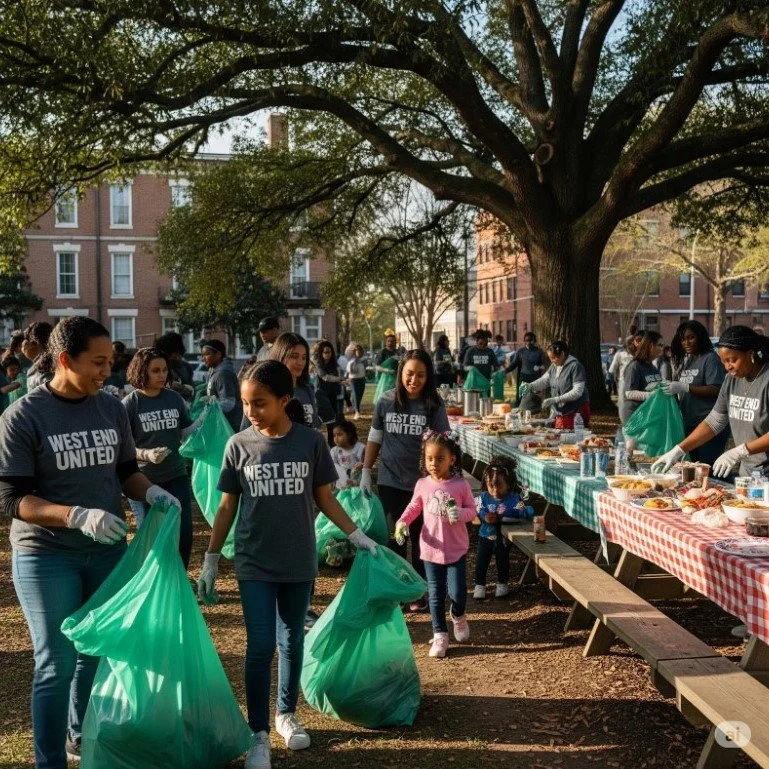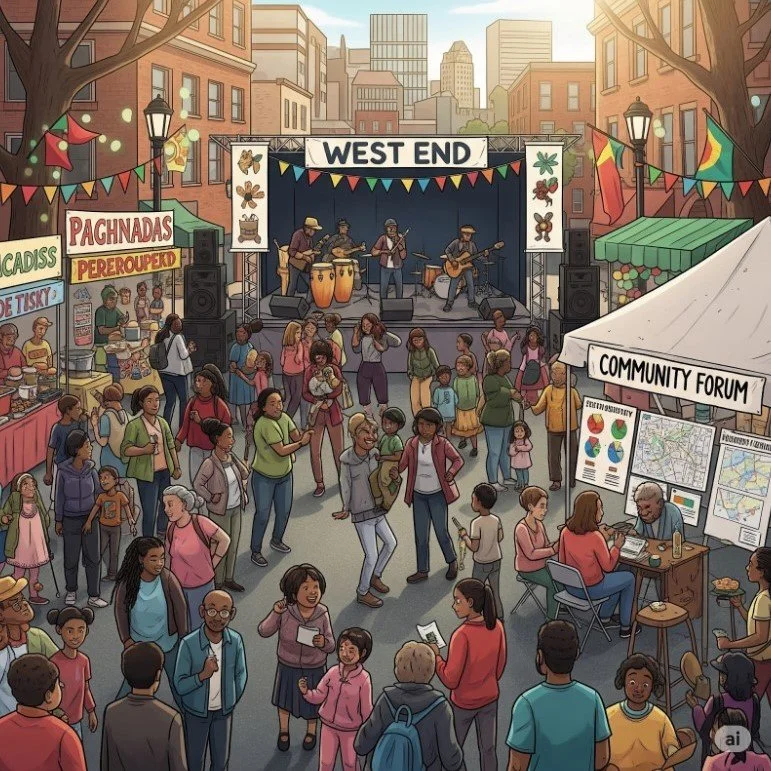
Participatory Budgeting - Proposals
Giving people real power over real money.
The West End Revitalization has secured $40,000 for West End residents, business owners, and workers to invest in the community in 2025.
The Steering Committee reviewed every idea submitted, and narrowed them down to 8 proposals, which you can read below.
Voting is now closed. From August 30 to September 12, people connected to Rock Island’s West End had the chance to vote for up to three proposals online or by paper ballot at the MLK Center and partner locations. Thank you to everyone who participated and made their voice heard. Together, we are shaping a brighter future for our community!
Join us on Tuesday, September 16 at the MLK Center for the announcement of the winning projects. Together, we’ll celebrate the results and take the next step toward a stronger West End.
Proposal 1:
Neighbors Helping Neighbors Landscaping Services
Cost estimate: $20,000 to $30,000
At-a-glance: Paid training and jobs for youth (16–25) to provide lawn care, snow shoveling, salt laying, and native planting for seniors, neighbors with disabilities, and others who need help.
What it does: This program hires and trains local youth to deliver seasonal outdoor services—mowing, trimming, fall leaf pickup, winter snow/ice care, and native plant installs. It supports neighbors who could use a hand to live independently and safely, while giving young people real work experience, safety training, and a paycheck.
How it works:
Youth (16–25) apply for paid positions; training and protective gear are provided.
Seniors, residents with disabilities, and others can request services; neighbors can also sign up to volunteer.
Weekly capacity depends on staff, equipment, and weather; requests are scheduled on a first-come basis.
Funds cover equipment, fuel, maintenance, safety supplies, and wages.
Why it matters: Neighbors get timely help with essential outdoor tasks. Youth gain skills, references, income, and a pathway into trades and green jobs. The program strengthens trust between generations and models “neighbors helping neighbors.”
How this supports the West End Plan:
The plan calls for workforce pathways and a potential service corps that can tackle public tasks like park and streetscape maintenance — creating paid work for local residents and disconnected youth.
Proposal 3:
8th Grade Promotion for Family InterACTION
Cost estimate: $5,000 to $7,500
At-a-glance: A yearly Career Exploration Day that connects middle-school students and their families with high schools, employers, trades, colleges, military reps, and scholarships as a rite of passage, so that students and adults can map a real plan for life after graduation.
What it does: This event celebrates the transition to high school and makes it easier for families to assess options. Students meet employers and training providers, learn about apprenticeships and college programs, and take home a simple guide to local high schools, financial aid, and career pathways. School counselors follow up with interested students.
How it works:
One annual fair with booths, brief talks, and hands-on demos.
Take-home pamphlet covers scholarships, FAFSA basics, timelines, and contacts.
Encourages counselor check-ins for next steps.
Why it matters: Families get clear, local information. Students discover careers they didn’t know existed. Early exposure increases confidence and helps youth choose classes and activities that fit their goals.
How this supports the West End Plan: The plan calls for workforce training and jobs fairs — specifically at Rock Island High School and key sites — to connect disconnected youth with apprenticeships and career paths.
Proposal 4:
Take Back The Block: Neighborhood Associations
Cost estimate: $15,000 to $20,000
At-a-glance: Seed three new neighborhood associations where none exist—train local block captains, host regular meetings, and fund four community events per year per association.
What it does: Resident leaders will define neighborhood boundaries, recruit neighbors, and set up monthly meetings to share information, solve problems, and plan improvements. Quarterly workshops build leadership skills (meeting facilitation, outreach, conflict resolution, grant basics). Mini-grants support clean-ups, block parties, or safety walks.
How it works:
Identify and train neighborhood captains.
Provide meeting materials, outreach tools, and event micro-funding.
Share simple templates so neighbors can keep things going long-term.
Why it matters: When neighbors are organized, they communicate better, respond faster to issues, and can win resources together. Associations become trusted hubs for events, safety efforts, and city conversations.
How this supports the West End Plan:
Civic capital is a key impact area: engaged residents, inclusive leadership, authentic communication, and a culture of engagement.
Cross-cutting actions explicitly include cultivating community engagement and ownership.
Proposal 5:
Fresh West Farmers Market
Cost estimate: $5,000
At-a-glance: A free, monthly neighborhood farmers market (May–July) with no vendor fees, where residents can buy affordable, locally grown food and West End vendors can earn income.
What it does: The market offers a welcoming space to buy fresh produce and homemade goods, meet local growers and makers, and showcase neighborhood entrepreneurs. Free vendor booths remove barriers for first-time sellers and lift up home-based businesses. The market also raises visibility for healthy eating and gardening.
How it works:
First weekend of each month, May–July (start ~11:30 a.m./noon).
Free to attend; West End residents get priority for vendor spots.
Outreach partners help with nutrition info, gardening tips, and SNAP/benefit awareness where possible.
Why it matters: Residents gain better access to healthy food close to home. Vendors test products, build customer bases, and learn business basics in a low-risk environment.
How this supports the West End Plan:
The plan highlights improving access to healthy food and amenities as a neighborhood need.
It also prioritizes small business/entrepreneur support via a navigator model to grow local enterprises.
Proposal 6:
QC Passport – Cultural Passes, Programs, & Events
Cost estimate: $10,000 to $20,000
At-a-glance: Free or discounted sports, fitness, art, theater, music, and education passes for West End residents, plus up to six family outings in 2026 with free bus transportation to local destinations (e.g., Putnam Museum, Botanical Center).
What it does: The QC Passport reduces cost and transportation barriers so neighbors of all ages can join local programs and events. Residents pick up special coupons/passes to register with partners; costs are covered by West End Revitalization funds. Group trips build confidence for first-time participants and keep things family-friendly.
How it works:
Build partnerships with arts, culture, sports, and education organizations.
Distribute time-limited passes and track usage to learn what residents enjoy.
Schedule six bus-supported family trips across the year.
Why it matters: Belonging grows when folks can show up. Lowering barriers to community life strengthens pride, mental health, and cross-neighborhood connections.
How this supports the West End Plan:
Advancing civic capital — engaged residents, shared vision, culture of engagement — is an explicit plan goal.
The plan also references creative placemaking as a tool for community and economic vitality: arts and culture programming that animates public life.
Proposal 7:
West End Clean Start
Cost estimate: $5,000 to $7,500
At-a-glance: Quarterly (or twice-yearly) neighborhood clean-ups with supplies and a celebratory picnic, plus two free special trash pick-up days exclusively for West End residents.
What it does: Clean Start brings neighbors together to remove litter and bulky items, reduce illegal dumping, and make streets safer and more welcoming. After each clean-up, a simple picnic thanks volunteers and encourages new connections.
How it works:
Community-wide clean-ups once per quarter or twice per year.
Provide gloves, bags, grabbers; coordinate with city partners and service providers.
Host two free special pick-up days for West End residents to clear large items.
Why it matters: Cleaner blocks boost pride, property upkeep, and safety. Regular clean-ups are an easy way for people of all ages to pitch in.
How this supports the West End Plan: The plan encourages early, visible wins like weekly neighborhood clean-ups and beautification projects as part of building momentum and capacity.
Proposal 2:
Each One, Teach One Skill-Share Program
Cost estimate: $5,000 to $12,000
At-a-glance: Free, monthly, neighbor-led workshops on practical life skills (eg finance, trades, entrepreneurship, gardening, cooking, and more), celebrating local talent and building community.
What it does: Starting January 2026, community members with a skill or craft teach short, accessible sessions open to all ages. Topics range from budgeting and credit basics to home repairs, entrepreneurship and cooking, music, and small-business tips. Instructors receive modest honoraria for their time and expertise.
How it works:
One session per month; family-friendly and free to attend.
Sign-ups available for both teachers and learners.
Simple take-home guides help people keep practicing at home.
Why it matters: Practical knowledge saves money, builds confidence, and can spark side-hustles or careers. The program also lifts up community experts and connects neighbors across generations.
How this supports the West End Plan:
The plan prioritizes financial literacy and coaching for residents.
It also promotes entrepreneurship education and a small-business support ecosystem, including teaching youth about business ownership.
Proposal 8:
West End Community Celebrations
Cost estimate: $10,000 to $15,000
At-a-glance: Up to 20 open-to-all events (e.g., festivals, youth showcases, neighborhood dinners) will receive minimum $500 sponsorships to celebrate West End culture and invite residents into civic life.
What it does: This fund backs resident-led events that bring people together across blocks, schools, and organizations. Events must be open to all West End residents and should include a simple “get involved” moment: sign-ups for neighborhood groups, youth programs, or upcoming city processes.
How it works:
Simple application; priority for events hosted in the West End.
Clear community benefit (connection, culture, information-sharing).
Quick wrap-up summary (attendance, partners, photos) to help improve future events.
Why it matters: Celebration builds belonging. When neighbors gather often, trust grows — along with the capacity to do bigger things together.
How this supports the West End Plan:
Civic capital — engaged residents, authentic communication, and a culture of engagement — is central to long-term success.
A cross-cutting communications/engagement approach is part of the plan’s foundation.


